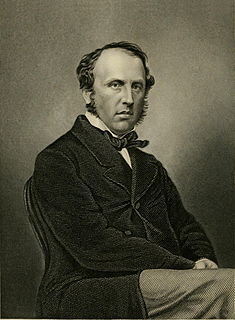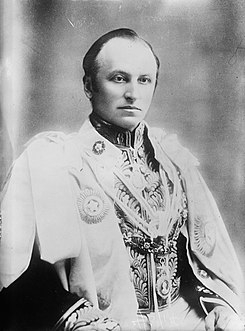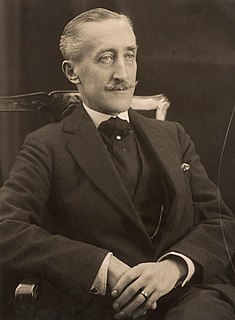 W
WCharles Canning, 1st Earl Canning,, also known as The Viscount Canning and Clemency Canning was a British statesman and Governor-General of India during the Indian Rebellion of 1857 and the first Viceroy of India after the transfer of power from the East India Company to the Crown of Queen Victoria in 1858 after the rebellion was crushed.
 W
WFrederic John Napier Thesiger, 1st Viscount Chelmsford, was a British statesman who served as Governor of Queensland from 1905 to 1909, Governor of New South Wales from 1909 to 1913, and Viceroy of India from 1916 to 1921, where he was responsible for the creation of the Montagu–Chelmsford Reforms. After serving a short time as First Lord of the Admiralty in the government of Ramsay MacDonald, he was appointed the Agent-General for New South Wales by the government of Jack Lang before his retirement.
 W
WGeorge Nathaniel Curzon, 1st Marquess Curzon of Kedleston,, was styled as Lord Curzon of Kedleston between 1898 and 1911, and as Earl Curzon of Kedleston between 1911 and 1921, was a British Conservative statesman who served as Viceroy of India from 1899 to 1905. During his time as viceroy, Lord Curzon created the territory of Eastern Bengal and Assam. He resigned after a political dispute with the British military commander Lord Kitchener. During the First World War, Curzon served in the small War Cabinet of Prime Minister David Lloyd George as Leader of the House of Lords, as well as the War Policy Committee. He served as Secretary of State for Foreign Affairs at the Foreign Office from 1919 to 1924.
 W
WFrederick Temple Hamilton-Temple-Blackwood, 1st Marquess of Dufferin and Ava was a British public servant and prominent member of Victorian society. In his youth he was a popular figure in the court of Queen Victoria, and became well known to the public after publishing a best-selling account of his travels in the North Atlantic.
 W
WJames Bruce, 8th Earl of Elgin and 12th Earl of Kincardine, was a British colonial administrator and diplomat. He served as Governor of Jamaica (1842–1846), Governor General of the Province of Canada (1847–1854), and Viceroy of India (1862–1863). In 1857, he was appointed High Commissioner and Plenipotentiary in China and the Far East to assist in the process of opening up China and Japan to Western trade. In 1860, during the Second Opium War in China, in retaliation for the torture and execution of almost twenty European and Indian prisoners, he ordered the destruction of the Old Summer Palace in Beijing, an architectural wonder with immeasurable collections of artworks and historic antiques, inflicting invaluable loss of cultural heritage. Subsequently, he compelled the Qing dynasty to sign the Convention of Peking, adding Kowloon Peninsula to the British crown colony of Hong Kong.
 W
WVictor Alexander Bruce, 9th Earl of Elgin, 13th Earl of Kincardine,, known as Lord Bruce until 1863, was a right-wing British Liberal politician who served as Viceroy of India from 1894 to 1899. He was appointed by Prime Minister Arthur Balfour to hold an investigative enquiry into the conduct of the Boer War in 1902 to 1903. The Elgin Commission was the first of its kind in the British Empire, and it travelled to South Africa and took oral evidence from men who had actually fought in the battles. It was the first to value the lives of the dead and to consider the feelings of mourning relatives left behind, and it was the first occasion in the history of the British Army that recognised the testimony of ordinary soldiery as well as that of the officers.
 W
WEdward Frederick Lindley Wood, 1st Earl of Halifax,, known as The Lord Irwin from 1925 until 1934 and The Viscount Halifax from 1934 until 1944, was a senior British Conservative politician of the 1930s. He held several senior ministerial posts during this time, most notably those of Viceroy of India from 1925 to 1931 and of Foreign Secretary between 1938 and 1940. He was one of the architects of the policy of appeasement of Adolf Hitler in 1936–38, working closely with Prime Minister Neville Chamberlain. However, after Kristallnacht and the German occupation of Czechoslovakia in March 1939 he was one of those who pushed for a new policy of attempting to deter further German aggression by promising to go to war to defend Poland.
 W
WCharles Hardinge, 1st Baron Hardinge of Penshurst, was a British diplomat and statesman who served as Viceroy and Governor-General of India from 1910 to 1916.
 W
WHenry Charles Keith Petty-Fitzmaurice, 5th Marquess of Lansdowne, was a British statesman who served successively as Governor General of Canada, Viceroy of India, Secretary of State for War, and Secretary of State for Foreign Affairs. In 1917, during the First World War, he wrote the "Lansdowne Letter" advocating, in vain, a compromise peace. A millionaire, he has the distinction of having held senior positions in Liberal and Conservative Party governments.
 W
WJohn Laird Mair Lawrence, 1st Baron Lawrence,, known as Sir John Lawrence, Bt., between 1858 and 1869, was an English-born Ulsterman who became a prominent British Imperial statesman who served as Viceroy of India from 1864 to 1869.
 W
WVictor Alexander John Hope, 2nd Marquess of Linlithgow, was a British Unionist politician, agriculturalist, and colonial administrator. He served as Governor-General and Viceroy of India from 1936 to 1943. He was usually referred to simply as Linlithgow.
 W
WEdward Robert Lytton Bulwer-Lytton, 1st Earl of Lytton, was an English statesman, Conservative politician, and poet. He served as Viceroy of India between 1876 and 1880—during his tenure Queen Victoria was proclaimed Empress of India—and as British Ambassador to France from 1887 to 1891.
 W
WRichard Southwell Bourke, 6th Earl of Mayo, styled Lord Naas between 1842 and 1867, called Lord Mayo in India, was a statesman, Viceroy of India and prominent member of the British Conservative Party from Dublin, Ireland.
 W
WGilbert John Elliot-Murray-Kynynmound, 4th Earl of Minto,, known as Viscount Melgund by courtesy from 1859 to 1891, was a British peer and politician who served as Governor General of Canada, the eighth since Canadian Confederation, and as Viceroy and Governor-General of India, the country's 17th.
 W
WAdmiral of the Fleet Louis Francis Albert Victor Nicholas Mountbatten, 1st Earl Mountbatten of Burma, was a member of British royal family, Royal Navy officer and statesman, a maternal uncle of Prince Philip, Duke of Edinburgh, and second cousin once removed of Queen Elizabeth II. During the Second World War, he was Supreme Allied Commander, South East Asia Command. He was the last Viceroy of India of British India, and the first governor-general of the Dominion of India.
 W
WThomas George Baring, 1st Earl of Northbrook, was a British Liberal statesman. Gladstone appointed him Viceroy of India 1872–1876. His major accomplishments came as an energetic reformer who was dedicated to upgrading the quality of government in the British Raj. He began large scale famine relief, reduced taxes, and overcame bureaucratic obstacles in an effort to reduce both starvation and widespread social unrest. He served as First Lord of the Admiralty between 1880 and 1885.
 W
WRufus Daniel Isaacs, 1st Marquess of Reading, was a British Liberal politician and judge, who served as Lord Chief Justice of England, Viceroy of India, and Foreign Secretary, the last Liberal to hold that post. The second practising Jew to be a member of the British cabinet, Isaacs was the first Jew to be Lord Chief Justice, and the first, and as yet only, British Jew to be raised to a marquessate.
 W
WGeorge Frederick Samuel Robinson, 1st Marquess of Ripon,, styled Viscount Goderich from 1833 to 1859 and known as the Earl of Ripon in 1859 and as the Earl de Grey and Ripon from 1859 to 1871, was a British politician and Viceroy and Governor General of India who served in every Liberal cabinet between 1861 and 1908.
 W
WField Marshal Archibald Percival Wavell, 1st Earl Wavell, was a senior officer of the British Army. He served in the Second Boer War, the Bazar Valley Campaign and World War I, during which he was wounded in the Second Battle of Ypres. He served in the Second World War, initially as Commander-in-Chief Middle East, in which role he led British forces to victory over the Italians in western Egypt and eastern Libya during Operation Compass in December 1940, only to be defeated by the German Army in the Western Desert in April 1941. He served as Commander-in-Chief, India, from July 1941 until June 1943 and then served as Viceroy of India until his retirement in February 1947.
 W
WFreeman Freeman-Thomas, 1st Marquess of Willingdon, was a British Liberal politician and administrator who served as Governor General of Canada, the 13th since Canadian Confederation, and as Viceroy and Governor-General of India, the country's 22nd.